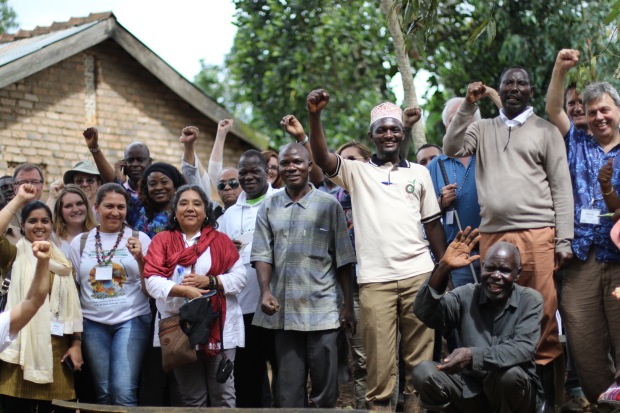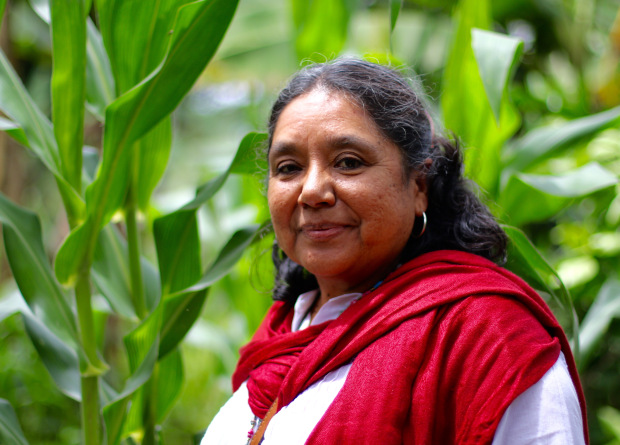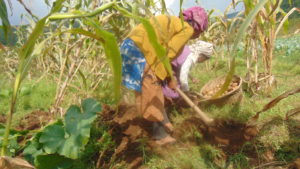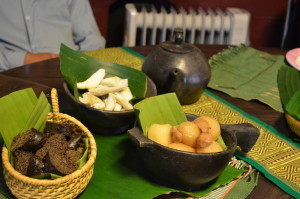Maria Estela Barco Huerta, General Coordinator of DESMI in Mexico, reflects on the agroecology learning exchange in Uganda that the Agroecology Fund hosted in partnership with the Alliance for Food Sovereignty in Africa this Spring.
When we received the invitation to participate in the learning exchange in Uganda, it seemed impossible to travel to such a distant land that is Africa. We were requested to bring a farmer, preferably a woman, to join this gathering, but it was difficult to convince them to travel. Our partners and peers, who are part of the Zapatista movement and have practiced agroecology for a longer time, don’t travel to these meetings. It’s a decision they have taken for several years within the movement. At the end, Rigoverto Albores, an agroecology trainer and I, as the team coordinator, agreed to represent DESMI.
The gathering in Uganda was very rewarding despite the limitation of language. With Katherine and Lorenzo’s translation, we could participate in the activities and share the work of DESMI. This gathering was enriching; I met women and men who have passionately defended Mother Earth, both personally and within their organizations. It seemed like we all value learning from indigenous and rural communities. We all recognized the vitality of ancestral knowledge of indigenous peoples, and we are fighting to preserve it.
Setting the intention with opening mística
This moment was very important to initiate each day to set the tone, create an intentional environment and prepare for the gathering. We learned about ceremonies and rituals from different countries and it was a moment to reaffirm our struggles and commitments.
Sharing regional experiences
We created posters to share more deeply about our organizations and movements. For me, it was important to learn the work of other groups, the challenges they face in their own countries, such as the struggle to stop GMO maize in Mexico, GMO bananas in Uganda, etc. Each organization has its own methodology; some approaches are similar. In the end, we’re all striving for agroecology to become a way of life in the communities we work with. We were also able to share what has worked for us and the lessons we have learned.

Dialoguing and Listening
We recognized that agroecology is a path that we’re constantly walking on, a path that encourages possibilities (big or small) to achieve food sovereignty, including the right to be a small peasant farmer. Agroecology is also a solution to cool the planet, and hold large multinational companies accountable for their role in accelerating climate change. I learned about organizations that are marketing agroecological foods and have strengthened a solidarity economy with indigenous people.
Visits to farms of local communities
This site visit was a good experience; it allowed us to witness their work and learn about the culture of African communities. This experience reaffirmed what small farmers can achieve with their own knowledge, by adding new techniques, such as biodigesters, water harvesting, integration of various crops, women’s leadership and harnessing community wisdom. It was great to see the joy and willingness of peasant farmers to share how they cultivate crops. It was interesting to learn how communities make their clothes traditionally with the bark of a tree, and grow coffee. I found the people from Africa very noble.
Building strategies, linking struggles to defend Mother Earth
I think we made good progress in clarifying that we’re all working towards the same goal. We agreed on the need to expand agroecology globally, including in the United States. We also dialogued on how we can defend the seeds of farmers so that they remain in their ownership, and are protected from threats by Monsanto and other big transnational seed corporations.
We recognized the importance of linkages that strengthen our work, that provide, both, positive and critical feedback to our collection of experiences. In other words, no one should work in isolation, and it’s not enough to work only with indigenous peoples in the communities. Instead, we are looking for partnerships to mutually strengthen each other. We also talked about the importance of educating, from an agroecological perspective, to care for Mother Earth as a way to promote local advocacy. We see the value of strengthening communities so that rural families—women and men—can stop transnational forces. The power also lies in indigenous communities. Governments have forgotten where the power exists, as they govern in favor of large interests and suppress the rights of people who elected them. Now the governments want to patent seeds to deliver them to transnational corporations like Monsanto and open doors of our countries to GMOs. Only the strength of community organizing can deter this. As the Zapatistas say “the people rule and the government obeys.”
A dialogue with funders
The presence of women and men who had the vision to create the Agroecology Fund was important. Firstly, we were able to meet them in person, and they were no longer names, but people who have dreams and ideals like us. We all seek to change the systems of food production so that fertility is restored to Mother Earth, and she can continue to feed us. The funders are people who believe in our work and in the struggles of peasant farmers for exercising their right to food every day, and who defend our seeds because they are inherited from our grandmothers and grandfathers. The Fund members are working to amplify agroecology across the globe as a model that can be mainstreamed, where food sovereignty of all people is secured.




